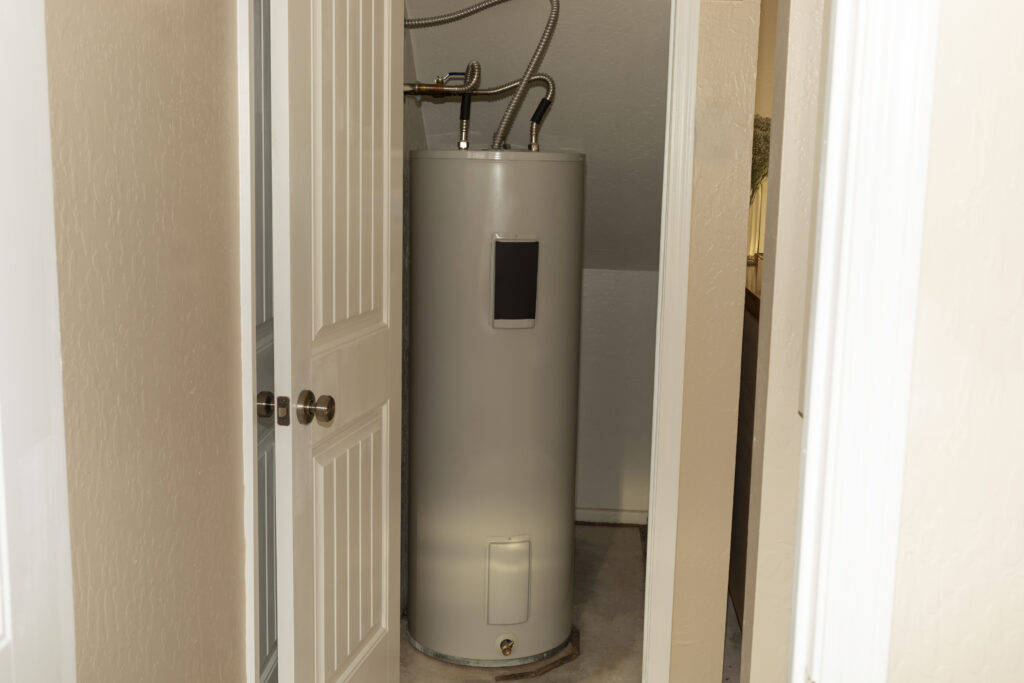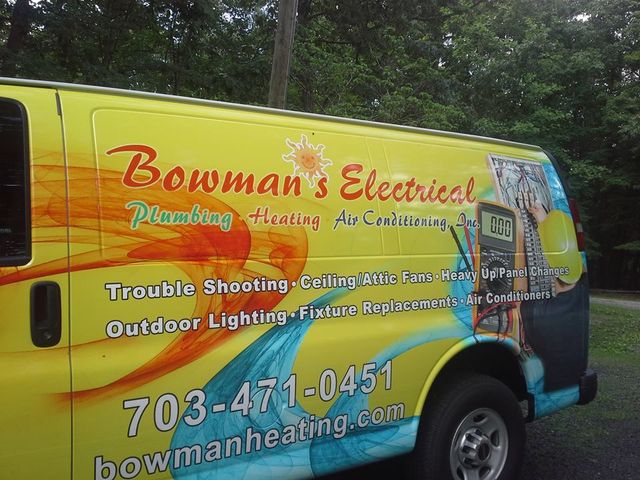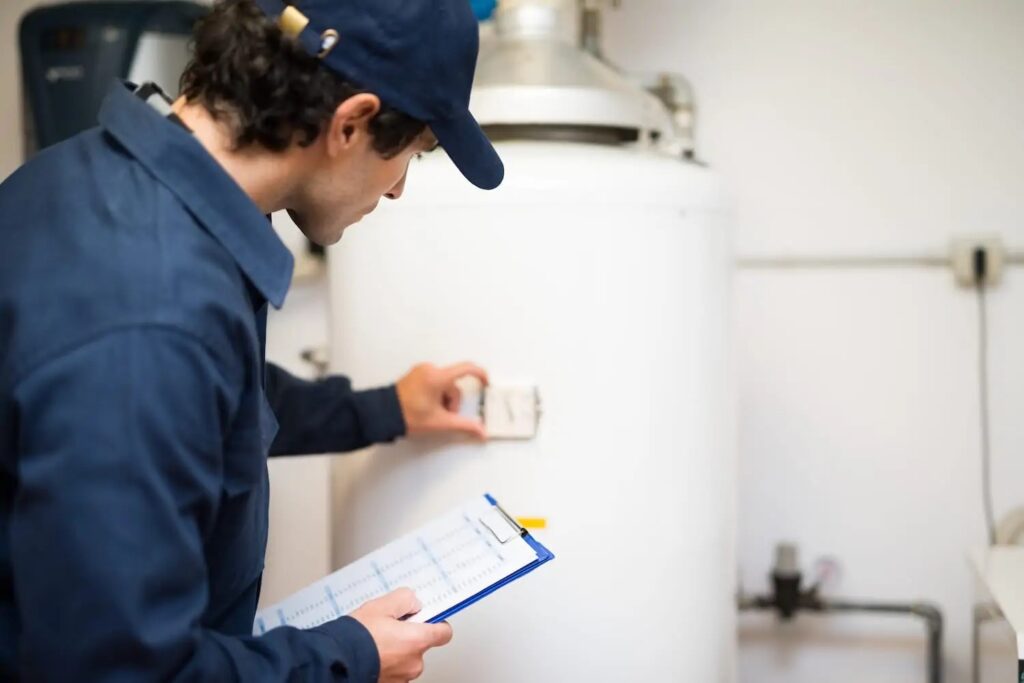
Your water heater is perhaps one of the most important appliances in your home. From providing hot water for dishes, laundry, cooking, cleaning, and bathing, you count on it for efficient and effective service.
What happens when you discover that your water heater has reached the end of its lifespan? Instead of funneling more money into repairs or ignoring issues like water temperature inconsistency and waiting for a complete system failure, you should plan for a water heater replacement.
There are numerous types of water heaters on the market today. From ENERGY STAR standards to combination water heaters, choosing a new water heater for your home can feel overwhelming.
Luckily, the pros at Bowman’s Plumbing, Heating, Air Conditioning & Electrical, Inc. are here to help. We can walk you through a variety of water heater types and provide you with easy-to-understand pros and cons, as well as the benefits of each, so you can decide on the best new water heater for your home.
Types of Water Heaters

How many different types of water heaters exist today? You’re likely familiar with tank-style water heaters and even tankless models. There are other types of water heaters that you should be familiar with. We’ll discuss 10 types of water heaters and why they might be the right fit for your household.
1. Conventional Tank
The conventional tank water heater is the one you’re likely most familiar with. These types of water heaters heat and store a large volume of water, typically 30 to 80 gallons. Energy sources for this type of water heater include electricity, natural gas, propane, or oil.
- Pros: Reliable supply and lower upfront cost
- Cons: Energy waste from perpetually heating water (standby loss) and limited capacity
2. Tankless
Tankless water heaters, also referred to as on-demand water heaters, differ from their conventional tank counterparts. Instead of perpetually heating and storing water, these systems heat water as needed, providing a virtually endless supply of hot water. Whether gas or electric, homeowners will enjoy reduced energy costs with this water heater.
- Pros: Compact size, virtually limitless hot water, and energy-efficient
- Cons: Higher upfront costs and limited flow rate when multiple sources vie for hot water
3. Heat Pump Hybrid
This highly efficient water heater uses electricity to pull warmth from the surrounding air and transfers it into the water heater’s tank. The hybrid aspect of this water heater refers to its ability to utilize the heat pump as its primary method of water heating.
- Pros: Energy efficient, saving on costs, and reducing environmental impact
- Cons: Higher upfront costs and best in warm climates or basements with adequate air circulation
4. Solar
As the name suggests, this water heater utilizes solar panels to capture solar energy and heat water within the tank. While this is a highly efficient type of water heater, homeowners should consider the costs associated with installation.
- Pros: Low operating costs and high energy efficiency
- Cons: Higher upfront costs and diminished energy collection on cloudy days (needs backup power supply)
5. Condensing
Similar to conventional tank water heaters, condensing water heaters capture heat from exhaust gases and use it to heat water for a home. For homes with natural gas access, this presents a highly efficient mode of water heating.
- Pros: Energy efficient for homes with access to natural gas
- Cons: Needs proper venting and can be more expensive
6. Indirect
An indirect water heater is one that utilizes a home’s existing heating system, such as a boiler, through a heat exchanger to heat water for showers, bathing, and other purposes, rather than relying on its own burner or electric coils. These types of water heaters are best for homes with boiler-based heating systems.
- Pros: Energy efficient when paired with a high-efficiency boiler, especially during heating season
- Cons: Requires a boiler system and is not as efficient when the boiler is not running (during summer)
7. Combi-Boiler
A combi-boiler, also known as a combination boiler, is a standalone system that provides both whole-home heating as a boiler and on-demand hot water for a medium-sized home. Efficient and space-saving, this system heats water directly from the main supply.
- Pros: Space-saving design, no need for a separate water heater and central heating system
- Cons: Not ideal for large homes; may struggle to provide simultaneous hot water and central heating
8. Point-of-Use
Point-of-use water heaters, also known as mini water heaters or under-sink water heaters, receive an honorable mention in this list. These are supplementary water heaters that provide hot water where it is needed, on demand, often for distant sinks.
- Pros: Eliminates wait times, is installed underneath distant sinks, and can be tank or tankless
- Cons: Limited capacity and typically supplements another water heater
9. Recirculation
This isn’t exactly a water heater itself, but a mechanism or recirculating pump that constantly circulates hot water through the pipes of your home, delivering it to faucets and taps as needed. When the water cools down, it is pumped through the heater again to maintain the temperature.
- Pros: Provides instant hot water and reduces water waste
- Cons: Continuous operation increases energy use
10. Geothermal
This energy-conscious water heater uses leftover heat from a geothermal heat pump system to heat water for a home. Sometimes referred to as a desuperheater, this system is installed as part of an HVAC system as an auxiliary heat exchanger.
- Pros: Extremely energy efficient, uses renewable geothermal energy as a resource
- Cons: Expensive and only practical if you have or plan to install a geothermal heat pump
Quick How-To Guide on Choosing Your New Water Heater

Now that you know the 10 different types of water heaters and their pros and cons, you’re better equipped with the knowledge of what type of water heater is right for your home.
It’s always a good idea to meet with a professional plumber to understand the unique needs of your household. For instance, when you work with a plumber from our team, we’ll walk through a variety of considerations when you’re deciding on a new water heater installation. Here are some of the factors we’ll talk through:
Size
Consider the size of your home and your family’s hot water needs. Larger homes and families may require a more robust source of hot water or additional point-of-use water heaters as needed.
Fuel Type
Determine what energy source your water heater will be able to access through your home. If you have access to natural gas, electric, geothermal, or solar energy, that opens up your options when deciding on a new water heater installation.
Efficiency Standards
Efficiency standards for water heaters are based on the Uniform Energy Factor (UEF), or how efficiently a system heats water and uses energy. The higher the UEF rating, the more efficient the water heater is.
Price Point
The cost of installing a new water heater will always be a consideration for you and your family. It’s essential to work with a plumbing contractor that has access to the best supply of water heaters and offers competitive prices based on both labor and unit costs.
You can count on Bowman’s to provide you with affordable pricing, as well as information about rebates and financing on approved credit.
Why Choose Us for Water Heater Installation?

At Bowman’s, we understand that making an installation decision for a new appliance in your home can seem daunting. With all the different types of water heaters and installation considerations, you might be tempted to give up the search. You can count on our team of professionals for help. We’ll walk with you through this important decision, providing expert guidance each step of the way.
Rely on Our Water Heater Experts for Your Next Installation
For years, we’ve been helping homeowners across the Northern Virginia region stay comfortable and productive at home. Whether you’re looking for an estimate on a new water heater or want to know the best way to care for your existing one, we can help with water heater repairs and maintenance plans.
Looking for more information on your next water heater installation? Contact our team of professionals today for more information!



